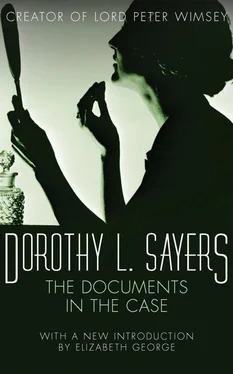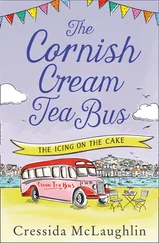Dorothy Sayers - The Documents in the Case
Здесь есть возможность читать онлайн «Dorothy Sayers - The Documents in the Case» весь текст электронной книги совершенно бесплатно (целиком полную версию без сокращений). В некоторых случаях можно слушать аудио, скачать через торрент в формате fb2 и присутствует краткое содержание. Жанр: Классический детектив, на английском языке. Описание произведения, (предисловие) а так же отзывы посетителей доступны на портале библиотеки ЛибКат.
- Название:The Documents in the Case
- Автор:
- Жанр:
- Год:неизвестен
- ISBN:нет данных
- Рейтинг книги:5 / 5. Голосов: 1
-
Избранное:Добавить в избранное
- Отзывы:
-
Ваша оценка:
- 100
- 1
- 2
- 3
- 4
- 5
The Documents in the Case: краткое содержание, описание и аннотация
Предлагаем к чтению аннотацию, описание, краткое содержание или предисловие (зависит от того, что написал сам автор книги «The Documents in the Case»). Если вы не нашли необходимую информацию о книге — напишите в комментариях, мы постараемся отыскать её.
The Documents in the Case — читать онлайн бесплатно полную книгу (весь текст) целиком
Ниже представлен текст книги, разбитый по страницам. Система сохранения места последней прочитанной страницы, позволяет с удобством читать онлайн бесплатно книгу «The Documents in the Case», без необходимости каждый раз заново искать на чём Вы остановились. Поставьте закладку, и сможете в любой момент перейти на страницу, на которой закончили чтение.
Интервал:
Закладка:
This sobered me. I had been feeling that we were well on the way to solve the problem. But now I saw very clearly that we were just as far away as ever. No jury in the world would accept this involved and unsubstantiated theory. True, people are ready enough to believe that an adulterer is very likely a murderer as well. But if it comes to the question of probability, which will they rather believe? That a man elaborately stole a rare and incomprehensible laboratorly product which none of them have ever heard of, and elaborately administered it under involved and peculiar circumstances? Or that an eccentric experimenter with ‘unnatural’ foods accidentally poisoned himself with toadstools? The answer is obvious.
Moreover, to obtain a conviction, there must be no doubt possible. The murder theory must be overwhelmingly more likely than the accident theory. Judges are careful to point this out.
I was as certain that Lathom had poisoned my father with synthetic muscarine as that I was alive. But I began to be equally certain that Lathom had hit upon a method of murder that was utterly and completely proof against proof.
52. Statement of John Munting
[Additional and concluding portion.]
This damned business of Lathom’s.
People write books about murders, and the nice young men and women in them enjoy the job of detecting. It is a good game and I like reading the books. But the emotions of the nice young people are so well-regulated, or so perfunctory, or something. They don’t feel like worms and get put off their dinners when they have succeeded in squeezing a damaging admission out of a friend. They don’t seem to suffer from fits of retching terror for fear they should find out something definite. Nor, while struggling with these complicated miseries, do they ever have to fulfil contracts with publishers. Sometimes they are filled with a stern sorrow — a nice, Brutus-like sentiment. I envy their nerves.
My nerves went back on me about the time of our visit to St Anthony’s. I took a kind of hysterical pleasure in pointing out that we had no proof of the murder. I didn’t want proof. I didn’t want to know. It was like writing one of those horrible letters which call for a decisive answer one way or another. You post it and wait, and you know that one morning you will see your correspondent’s handwriting on an envelope, and feel as hollow as a piece of bamboo. And you wait. Nothing comes. And after a time you say, ‘It’s been lost in the post. Now I need not know. Not now, at any rate, I can still pretend that it’s all right. Nothing will happen today. I can eat my dinner and listen to the wireless — and perhaps it will go on like that for ever.’
The answer to the Lathom problem seemed to have been lost in the post. We did not talk about it at home. My wife knew that I winced from it. It made other subjects impossible, too. Women, for instance, and the way they influence their lovers — we would start as far off as Gordon Craig’s theatre-masks or Gryll Grange and Lord Curryfin’s echeia , and before we had gone far, the figure of Clytemnestra would come bobbing over the horizon, and I would be talking hurriedly, dismissing it, rushing into technicalities about epode and stasimen, or about the chorus or the machines — anything. Or if Elizabeth merely asked what we should have for dinner, it seemed difficult to think of anything that was not flavoured with mushrooms or founded on beef-stock. We lived for a whole week on fish once, so sensitive did our minds become.
I got over it, more or less, after a time and, mercifully, Lathom let me alone. It was not till March that a faint reminding echo of the thing sounded faintly over the breakfast-table. I got a note from Mr Perry, the parson to whom I had once lent a volume of Eddington. At the sight of his name I got a kind of painful twitching in the sore place.
The note was to invite me to dinner. An old college friend of his, the extremely celebrated Professor Hoskyns, was coming over to spend the evening with him. Hoskyns is, of course, a very brilliant physicist, and Perry thought it would interest me to meet him. One or two other people were coming as well. If I could put up with a very simple meal, he thought we should enjoy a really enjoyable talk.
My fist instinct was to refuse. I hated the idea of going into the district and of seeing anybody even remotely connected with the Harrisons. But the idea of meeting Hoskyns was fascinating. I have that kind of vaguely inquiring mind that likes to be told what is going on, even though I could not be troubled to make a single experiment myself, and should not have the vaguest idea what experiment to make. A pap-fed, negative, twentieth-century mind open on all sides and wind-swept by every passing gust. Elizabeth thought that a chat with a bunch of scientific men would do me good. We need not, she said, mention the Harrisons. In the end, I accepted, and I rather think Elizabeth must have conveyed some sort of warning to Perry, for the Harrisons were not mentioned.
Perry’s shabby little sitting-room seemed crowded with men and smoke when I arrived. Professor Hoskyns, long, thin, bald, and much more human-looking than his press photographs, was installed in a broken-springed leather armchair and called Perry ‘Jim’. There was also a swarthy little man in spectacles whom they both called ‘Stingo’, and who turned out to be Professor Matthews, the biologist, the man who has done so much work on heredity. A large, stout, red-faced person with a boisterous manner was introduced as Waters. He was younger than the rest, but they all treated him with deference, and it presently appeared that he was the coming man in chemistry. Desultory conversation made it clear that Matthews, Hoskyns and Perry had been contemporaries at Oxford, and that Waters had been brought by Matthews, with whom he was on terms of the heartiest friendship and disagreement. A thin youth, with an eager manner and an irrepressible forelock, completed the party. He sported a clerical collar and informed me that he was the new curate, and that it was ‘a wonderful opportunity’ to start his ministry under a man like Mr Perry.
The dinner was satisfying. A vast beef-steak pudding, an apple-pie of corresponding size, and tankards of beers, quaffed from Perry’s old rowing-cups, put us all into a mellow humour. Perry’s asceticism did not, I am thankful to say, take the form of tough hash and lemonade, in spite of the presence on his walls of a series of melancholy Arundel prints, portraying brown and skinny anchorites, apparently nourished on cabbage-water. It rather tended to the idea of: ‘Beef, noise, the Church, vulgarity and beer,’ and I judged that in their younger days, my fellow-guests had kept the progs busy. However, the somewhat wearisome flood of undergraduate reminiscence was stemmed after a time with suitable apologies, and Matthews said, a little provocatively:
‘So here we all are. I never thought you’d stick to it, Perry. Which has made your job hardest — the War or people like us?’
‘The War,’ said Perry, immediately. ‘It has taken the heart out of people.’
‘Yes. It showed things up a bit,’ said Matthews. ‘Made it hard to believe in anything.’
‘No,’ replied the priest. ‘Made it easy to believe and difficult not to believe — in anything. Just anything. They believe in everything in a languid sort of way — in you, in me, in Waters, in Hoskyns, in mascots, in spiritualism, in education, in the daily papers — why not? It’s easier, and the various things cancel out and so make it unnecessary to take any definite steps in any direction.’
‘Damn the daily papers,’ said Hoskyns. ‘And damn education. All these get-clever-quick articles and sixpenny textbooks. Before one has time to verify an experiment, they’re all at you, shrieking to have it formulated into a theory. And if you do formulate it, they misunderstand it, or misapply it. If anybody says there are vitamins in tomatoes, they rush out with a tomato-theory. If somebody says that gamma-rays are found to have an action on cancer-cells in mice, they proclaim gamma-rays as a cure-all for everything from old age to a cold in the head. And if anybody goes quietly away into a corner to experiment with high-voltage electric currents, they start a lot of ill-informed rubbish about splitting the atom.’
Читать дальшеИнтервал:
Закладка:
Похожие книги на «The Documents in the Case»
Представляем Вашему вниманию похожие книги на «The Documents in the Case» списком для выбора. Мы отобрали схожую по названию и смыслу литературу в надежде предоставить читателям больше вариантов отыскать новые, интересные, ещё непрочитанные произведения.
Обсуждение, отзывы о книге «The Documents in the Case» и просто собственные мнения читателей. Оставьте ваши комментарии, напишите, что Вы думаете о произведении, его смысле или главных героях. Укажите что конкретно понравилось, а что нет, и почему Вы так считаете.












